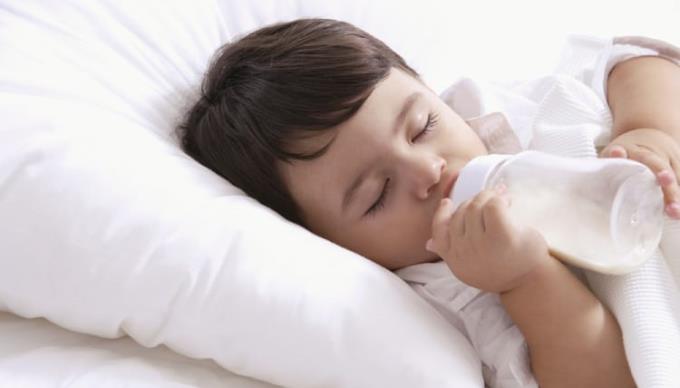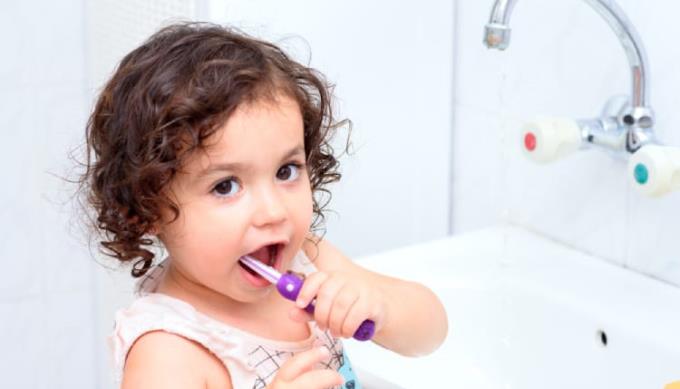Ways to determine an infants caloric needs

Learn how to determine your baby’s caloric needs, including the calories in breast milk and formula, to ensure your infant gets the right nutrition for healthy growth.
Tooth decay in children is caused by many causes such as bad diet, bad living habits, fluoride deficiency. Children with cavities can have a lot of troubles in living as well as health problems.
Cavities are damaged teeth caused by bacteria in the oral cavity that produce acids and attack enamel, leading to cavities forming in the teeth, causing pain, infection, and even loss of teeth. If you are looking for ways to prevent tooth decay for children, please refer to the information below of aFamilyToday Health.
Early caries often show no signs. You often only find out that your child has cavities when you observe that the child's teeth have small holes, discolored teeth, black or swollen gums ... :
Baby shows toothache when chewing or biting food
Teeth are sensitive to hot or cold foods
I have a toothache for no reason
Smelly breath ...
If you notice that your baby has one of the above signs, you should take him to the dentist immediately. Tooth decay, if not treated in time, can lead to tooth decay, tooth removal is required.
When we eat, some food debris gets stuck and stays in the teeth. Bacteria that reside in the oral cavity ferment the carbohydrates present in the food debris, creating acid. Acids attack, damaging the enamel leading to tooth decay. In addition, these bacteria also create plaque containing many acids that erode tooth enamel , causing tooth damage, forming cavities.
Some of the main causes of tooth decay include:
The cause of tooth decay in children is largely due to eating habits. High sugar content in foods that children eat affects their teeth. Children often love to eat sweets, chocolates, cream and foods high in sugar so they are susceptible to tooth decay.
In addition, the child drinking juice, soft drink, milk ... can also cause tooth decay. Teeth of children who regularly consume these drinks will be covered by sugar and coloring products in drinking water, increasing the risk of damaging tooth enamel, leading to infection.
Babies experiencing certain health conditions may also increase the risk of tooth decay. If your child has a chronic allergy, he or she may need to breathe through his mouth leading to dry mouth. Dry mouth is one of the dangers of increasing tooth decay.

Babies who have a habit of drinking a bottle at night are very susceptible to tooth decay. The reason is that milk contains sugar and can stick on teeth for hours, creating favorable conditions for bacteria to grow.
Fluoride is a natural mineral present in many foods and water, protecting teeth, helping to repair tooth damage in the early stages. This mineral is added to tap water, toothpaste and mouthwash. Children who use water without fluoride supplements and using non-fluoridated toothpaste are more likely to have a higher risk of tooth decay than other children.
The dentist will base on the child's decay status to propose an appropriate treatment for caries :
This method helps to restore the damage of tooth enamel, the first stage of tooth decay. If you look closely, you can see spots appearing on your child's teeth during this stage. The doctor can apply fluoride in the form of gel, foam ... to the baby's teeth to cover the small cavities and provide essential minerals for the teeth. In addition, your baby may be prescribed to use a toothpaste containing fluoride to repair damage on the tooth surface and restore the tooth surface.
If the child's teeth have formed large cavities but have not affected the pulp, the dentist will fill the child's teeth to protect the remaining teeth. Cavities in the teeth will be cleaned and then filled with dental amalgam or porcelain resin.
To save teeth that have been deeply damaged and cannot be filled in, dentists often require crowns. A crown is a sheath customized to the shape of the tooth to protect and restore the tooth's natural shell. In this treatment, the dentist grinds to remove the damaged tooth, refill and grinds the chewing surface and side to get the crown. After that, the teeth will be taken with high or powdered teeth to restore the crown. The crown is then placed on the teeth to protect against further damage.
Severe tooth decay can lead to pulp inflammation , causing damage to the pulp, and may require removal of the teeth to prevent infection from spreading. Dentists can reduce the risk of having a tooth removed by treating the pulp . The infected pulp will be removed, the hole cleaned and filled. In addition, depending on the condition of the tooth damage, the dentist may consider covering crowns to protect the teeth for the child.
If the tooth is heavily damaged and cannot be recovered due to the infection, it must be extracted to avoid spreading to the neighboring teeth. If the loss of the tooth seriously affects the aesthetics, making it difficult for the baby to eat and drink, the doctor may consider an implant or a bridge.

You can help your child prevent tooth decay in children by following the methods suggested below:
For babies and young children: You should use gauze or a mouthpiece to clean your child's mouth as soon as the baby has no teeth. When the first tooth appears, brush your child's teeth with a soft toothbrush and use a fluoride toothpaste.
Do not let your baby sleep while drinking a bottle or do not clean their teeth before bed: This is to prevent the baby's teeth from coming into contact with the path leading to infection, suffocation and tooth decay.
Rinse mouth often: Let your baby rinse his / her mouth clean after eating and drinking acids and sugar.
Use fluoridated water: Fluoride helps protect your child's teeth from infection. If you are using fluoridated water, consult your dentist for this mineral supplement.
Drink water, milk and other liquids from a cup instead of a bottle: As soon as your baby is one year old, practice giving him fluids from a cup or cup. Drinking liquid from cereals or cups helps to reduce the risk of tooth decay.
Limit foods high in sugar: Control the amount of sugary foods your child regularly eats. French fries, candy, jelly, cakes, ice cream ... contain sugar, which is a threat to the teeth and health if children consume in excess.
Do not share eating utensils: Sharing eating utensils, feeding food can infect children, affecting the oral health in particular, and digestive and respiratory health ... in general.
Check teeth regularly: When your child is 1 year old or when the baby starts to teething, take him to the dentist to promptly detect oral abnormalities. Maintaining the oral health of your baby will help your baby less likely to be infected with tooth decay.
In fact, making some positive changes in the diet can partly help prevent tooth decay in children. You:
Offer children fruits and vegetables instead of foods rich in carbohydrates. Pear, watermelon, celery, cucumber, green vegetables, broccoli ... are rich in fiber and low in sugar are good choices for children. Bananas, raisins, dried dates ... contain sugar, so children should only eat a limited amount and rinse their mouth clean after each meal.
You can add cheese to your child's diet because this food provides calcium, good for bones and teeth.
Limit the consumption of foods with sticky properties such as coconut candy, marshmallows, filter cake ... because they have the risk of sticking between teeth and creating conditions for bacteria to multiply. If your baby eats these foods, have them rinse their mouth or brush their teeth right after eating.
To have healthy teeth, you should practice your child in the habit of implementing the following tips:
Choose the right brush
Brush your teeth twice a day (morning and night)
After brushing, it is necessary to properly clean the brush
Use a tongue scraper to keep your tongue clean
Replace a new toothbrush every 3 months of use
Use mouthwash or salt water to rinse your mouth often
Flossing to clean between teeth instead of toothpicks and toothpicks can damage the enamel
Teach your children not to share food or dishes with anyone else
Minimize eating foods high in sugar
Limit snacking and rinsing after eating, and avoid late night snacking after brushing your teeth
Take your baby to a dental examination every 3 months.
aFamilyToday Health hopes that with the information provided above, you know how to properly care for your child's teeth to prevent tooth decay in children effectively.
Learn how to determine your baby’s caloric needs, including the calories in breast milk and formula, to ensure your infant gets the right nutrition for healthy growth.
Discover the top 5 smartest dog breeds in the world, including Border Collie, Poodle, German Shepherd, Golden Retriever, and Doberman Pinscher. Learn about their unique traits and why they are considered the most intelligent dogs.
Discover 7 nutritious and delicious ways to cook egg porridge for babies, including recipes with cheese, pumpkin, tomato, and more. Learn how to prepare baby-friendly egg porridge with our expert tips.
After a series of medical measures they obtained a complete human vascular system profile.
Watermelon is one of the fruits that many people love, not only cheap but also delicious, nutritious and refreshing in the summer. To get delicious watermelon pieces, show off your housewives, your artistic talents to cut beautiful pieces of watermelon.
aFamilyToday Health - The digestive system and body in each baby is different. Parents need to recognize notes to deal with when babies have a food allergy!
Babies need many factors for perfect development. aFamilyToday Health shares with parents things to keep in mind when babies are 8 weeks old so that parents can take care of their babies the best!
Babies need many factors for perfect development. aFamilyToday Health shares with parents things to keep in mind when babies are 18 weeks so that parents can take care of their babies the best!
Babies need many factors for perfect development. aFamilyToday Health shares with parents things to keep in mind when babies are 28 weeks old so that parents can take care of their babies the best!
Babies need many factors for perfect development. aFamilyToday Health shares with parents things to keep in mind when babies are 32 weeks old so that parents can take care of their babies the best!








